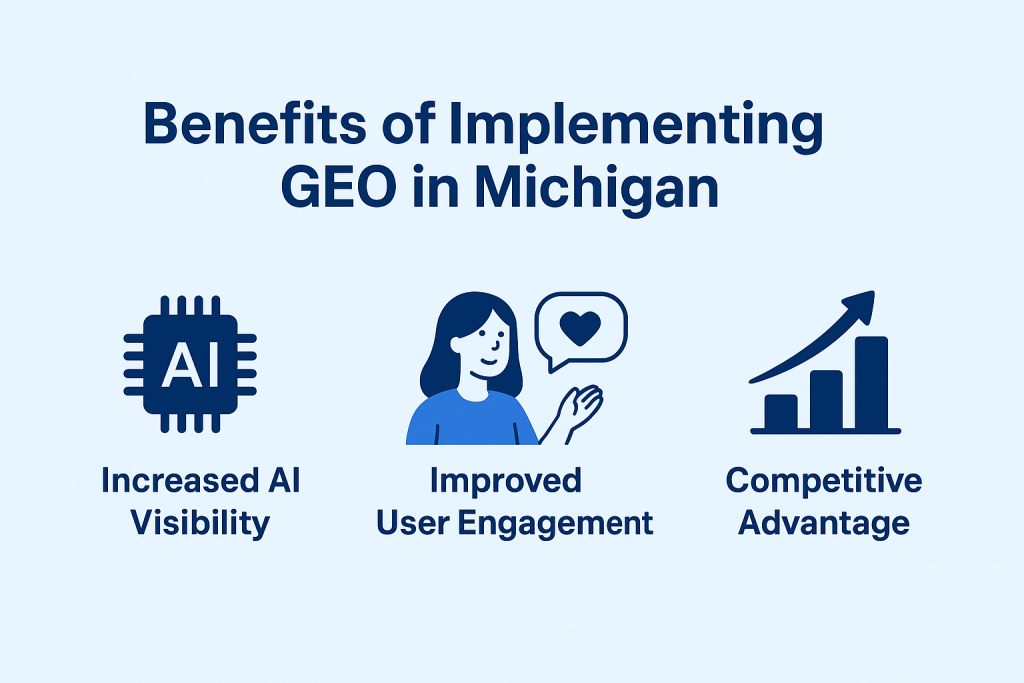What are Michigan Generative Engine Optimization Tactics?
Michigan Generative Engine Optimization Tactics refers to strategies that leverage generative AI models to create, optimize, and personalize content specifically for Michigan audiences. By combining AI tools like GPT, BERT, or T5 with local data—such as city-specific events, regional search trends, and Michigan-specific cultural references—businesses can produce content that ranks higher in search engines and resonates more effectively with local users. These tactics include generating blog posts, product descriptions, ad copy, and personalized recommendations that are tailored to the interests and behaviors of Michigan residents. Implementing GEO effectively helps companies increase engagement, attract local traffic, and deliver relevant experiences that reflect the unique characteristics of Michigan communities.
Benefits of Michigan Generative Engine Optimization Tactics

1
Increased AI Visibility:
By optimizing their content for AI systems, Michigan-based businesses can increase their chances of being featured in AI-generated responses, resulting in greater exposure.
2
Improved User Engagement:
Content that directly addresses user queries and provides valuable information can lead to higher engagement rates and user satisfaction.
3
Competitive Advantage:
Early adoption of GEO strategies can position businesses ahead of competitors who rely solely on traditional SEO methods.
Key Michigan Generative Engine Optimization Tactics

Structured Data Implementation
Utilize comprehensive schema markup to label content clearly for AI systems. This includes tagging provider profiles, service descriptions, and location pages to make information easily understandable by AI engines.

Semantic Content Creation
Develop content that addresses specific user intents and queries, rather than relying on keyword-centric writing. This involves crafting content that AI can easily parse and synthesize into a coherent response.s

Local Relevance Enhancement
For Michigan-based businesses, it’s essential to include localized information — such as regional keywords, accurate business listings, and culturally relevant content — to enhance AI recognition and relevance in local searches.
Michigan Generative Engine Optimization: Models and Implementation
Discover key data that reveals how Michigan’s Generative Engine Optimization strategies enhance online visibility and engagement.
GPT-Based Content Models
Generative AI models like OpenAI’s GPT series are highly effective for creating localized content that resonates with Michigan audiences. For instance:
- Use Case: Automatically generating blog posts, product descriptions, or social media content focused on Michigan cities like Detroit, Grand Rapids, or Ann Arbor.
- How to Implement: Fine-tune a GPT model using Michigan-specific datasets—local events, slang, landmarks, or local search queries—to make outputs more relevant. Integrate it into your CMS to produce content at scale while maintaining local relevance.
T5 or BERT for SEO-Optimized Copy
Models such as T5 (Text-to-Text Transfer Transformer) or BERT (Bidirectional Encoder Representations from Transformers) can help optimize content for search engines by understanding context in queries:
- Use Case: Optimizing your website for keywords like “Michigan outdoor activities,” “Detroit tech startups,” or “Michigan lake tourism.”
- How to Implement: Use these models to analyze top-ranking Michigan-focused pages, extract relevant keywords, and rephrase your content to match search intent while keeping a natural flow.
Localized and Geo-Targeted AI Applications
Generative models can be used to create dynamic, Michigan-specific experiences across websites and marketing platforms. From personalized recommendations to ad copy, these tools help businesses effectively engage local audiences.
- Personalized Recommendations: Combine generative AI with geolocation and user preference data to suggest nearby services, events, or businesses tailored to your specific needs. GPT can write engaging, human-like descriptions for these recommendations.
- Geo-Targeted Marketing & Ads: Generate ad copy tailored to Michigan regions and demographics. Train models on local data, such as customer reviews, events, and regional language, to enhance engagement and performance.
Examples of Big Companies Using Michigan Generative Engine Optimization Tactics
1. Amazon
Amazon uses GEO extensively to stay ahead in e-commerce. AI-generated product descriptions, automated meta tags, and dynamic keyword insertion keep millions of listings search-optimized and relevant. Personalized recommendations drive conversions by showing users items they are most likely to buy, while structured data helps Google display rich product snippets, increasing click-through rates.
2. Netflix
Netflix primarily utilizes GEO for personalization and content recommendations. AI algorithms analyze viewing habits and engagement to dynamically suggest shows and movies, keeping users engaged and entertained. They also use structured data to improve search discoverability for shows and series online. While they generate content descriptions automatically, meta tag optimization is more limited compared to e-commerce platforms.
3. Spotify
Spotify uses GEO to enhance user engagement primarily through personalized recommendations. Playlists and song suggestions are dynamically generated based on listening history. Meta tag optimization and structured data help improve the discoverability of podcasts and music online. AI content generation is used to create automated descriptions and playlist summaries, though it’s more limited than in e-commerce.
4. Shopify
Shopify implements GEO across its platform to help merchants optimize their stores. AI-generated product descriptions, automated meta tag creation, and dynamic keyword insertion enable sellers to quickly improve their SEO without requiring deep technical expertise. Personalized recommendations and structured data enhance the shopping experience, boosting conversion rates.
5. Airbnb
Airbnb uses GEO to enhance search relevance and personalization. Dynamic keyword insertion improves listing visibility when users search for specific locations or features. AI-generated property descriptions and structured data help search engines efficiently index listings. Personalized recommendations suggest accommodations that match user preferences, improving booking likelihood.

Real Michigan Brands Using Michigan Generative Engine Optimization Tactics
1. General Motors (Detroit, MI)
Industry: Automotive Manufacturing
Overview: General Motors is integrating artificial intelligence across its operations at the Detroit-based Factory Zero. AI and machine learning are utilized to enhance vehicle production, conduct predictive maintenance, and optimize features based on consumer preferences. Additionally, AI aids in real-time adjustments in manufacturing and marketing, improving customer targeting and product customization. This approach exemplifies how a major manufacturer is adopting AI to stay competitive in the automotive industry.
2. Locality (Detroit, MI)
Industry: Advertising Technology
Overview: Locality has introduced its Advanced Audience Engine, an innovative identity and activation platform designed to transform local advertising. The engine leverages generative AI and automation technologies to enhance advertiser capabilities. It integrates Locality’s historical media intelligence with real-time viewership data, enabling more innovative, efficient campaign management across both linear and digital platforms. This platform enables customized audience targeting through predictive modeling and vertical-specific segmentation, ultimately driving better ROI and streamlined campaign execution.
3. Skyodin (Kalamazoo, MI)
Industry: Digital Marketing
Overview: Skyodin, a digital marketing agency based in Kalamazoo, specializes in Generative Engine Optimization (GEO). They focus on improving the visibility and ranking of digital content by tailoring it for AI-driven search engines. GEO emphasizes optimizing content for meaning, intent, and AI-driven summaries, moving beyond traditional SEO practices. Skyodin’s approach helps businesses align their content with the evolving search landscape, ensuring better discoverability in AI-powered search results.
4. Traverse City Web Design (Traverse City, MI)
Industry: Web Design and Development
Overview: Traverse City Web Design emphasizes the importance of adapting to AI-driven search behaviors. They highlight the shift towards voice-driven and conversational queries, such as “Find me a Northern Michigan website designer who understands tourism marketing.” By structuring content to be rich in local detail and aligning with AI’s understanding of user intent, businesses can gain a competitive advantage in local search results. This approach underscores the significance of integrating AI considerations into web design and content strategies.
5. Digital Marketing Edge (Michigan)
Industry: Digital Marketing Education
Overview: Digital Marketing Edge explores how AI is redefining local SEO through Generative Engine Optimization tactics. They discuss the importance of creating content that is authoritative, trustworthy, and structured, allowing AI systems to understand and cite it easily. This approach emphasizes targeting user intent and providing comprehensive, factual answers, rather than focusing solely on keywords. By adopting these GEO strategies, businesses can improve visibility and engagement in AI-driven search results, aligning with the evolving landscape of digital marketing.
These Michigan-based brands and businesses demonstrate the successful implementation of Generative Engine Optimization tactics. While specific performance metrics are not always disclosed, the advancements in AI integration and the emphasis on aligning content with AI-driven search engines highlight the effectiveness of these strategies in enhancing visibility and engagement in the evolving digital landscape.
City-Specific GEO Strategies in Michigan
Detroit GEO Strategy
Detroit is one of the most search-active regions in Michigan, especially in automotive, sports, and tech. To optimize for Detroit audiences, businesses can incorporate:
- AI generated descriptions tied to the auto industry, such as electric vehicle features, dealership promotions, or factory technology updates.
- Local cultural references like Motown, the Detroit Riverfront, or Eastern Market.
- Neighborhood-specific content that reflects real user intent, such as “best food spots in Midtown Detroit” or “Detroit tech events this month.”
AI models respond strongly to hyper-local cues, which increases relevance in generative responses.
Ann Arbor GEO Strategy
University traffic, research institutions, and student-driven searches shape Ann Arbor’s digital ecosystem. Content enhancements include:
- AI produced guides for UMich students about housing, dining, and campus life.
- Research summaries or innovation spotlights tied to tech labs and startups.
- Academic and educational SEO tags that boost visibility for tutoring services, events, or study programs.
Grand Rapids GEO Strategy
Grand Rapids has a strong identity tied to tourism, arts, and furniture manufacturing. You can add:
- Generative itineraries focusing on art museums, breweries, or seasonal events.
- AI written descriptions for local businesses that highlight craftsmanship, sustainability, or urban design.
- Keyword clusters tied to “Grand Rapids tourism,” “ArtPrize,” and “Michigan craft industries.”
Traverse City GEO Strategy
Traverse City thrives on seasonal tourism, wineries, and outdoor activities. Strengthen local GEO by adding:
- AI generated lake tourism guides, winery highlights, and event roundups.
- Seasonal product recommendations tuned for summer, fall color tours, and winter festivals.
- Story-based content created by AI that connects users to local experiences.
Michigan Industry-Specific GEO Applications
Automotive Industry GEO
Michigan businesses can use AI to produce:
- Vehicle descriptions and dealership pages customized for location-based intent.
- Predictive maintenance content using generative explanations tied to driving conditions in Michigan.
- Personalized recommendations based on weather trends, commute patterns, or nearby dealerships.
Tourism and Hospitality GEO
AI can generate:
- Multi-day travel guides tailored to seasons and regions.
- Reviews, summaries, and attraction highlights structured for AI readability.
- Conversational content that matches voice search and natural language queries.
Education and University GEO
Universities and education providers can integrate:
- AI drafted content explaining programs, admissions requirements, and student life.
- Campus event summaries and academic support resources.
- Local SEO elements that support searches like “best study spots in Ann Arbor.”
E Commerce GEO
Local e commerce stores can enhance GEO with:
- AI generated product descriptions referencing Michigan seasons, weather, or holidays.
- Personalized recommendations tied to location data.
- Local slang or colloquial phrases that LLMs use to connect regional identity with product relevance.
Technical GEO Enhancements for Michigan Businesses
Structured Data Examples
Add schema markup to improve AI crawling and interpretation:
- LocalBusiness
- Event
- FAQ
- Product
- ServiceLocation
Michigan Keyword Cluster Table
| Core Keyword | Semantic Variations | Long Tail Queries |
|---|---|---|
| Michigan SEO | Michigan digital optimization | Best Michigan SEO tactics for small businesses |
| Detroit marketing | Detroit local search | How to rank in Detroit generative search |
| Michigan tourism SEO | Michigan travel content | AI generated travel guides for Northern Michigan |
AI Content Workflow Diagram
Explain your workflow:
- Collect Michigan-specific data
- Use GPT for long-form drafts
- Add local examples from Michigan cities
- Apply keyword clustering
- Edit for accuracy
- Optimize with internal links and schema
FAQ
Previously asked questions!
What is the primary goal of Generative Engine Optimization for Michigan-based businesses?
The primary goal of Generative Engine Optimization for Michigan-based businesses is to create content that is authoritative, trustworthy, and structured, allowing AI systems to understand and cite it easily. This approach emphasizes targeting user intent and providing comprehensive, factual answers rather than focusing solely on keywords, ultimately improving visibility and engagement in AI-driven search results.
What key models are used in Michigan Generative Engine Optimization Tactics, and how are they applied?
Models such as GPT, BERT, and T5 are used in Michigan Generative Engine Optimization. GPT is effective for generating localized content, such as blog posts and social media updates, targeting Michigan cities. BERT and T5 are utilized to analyze and optimize website content by understanding query context and enhancing keyword relevance, thereby improving search engine rankings and local relevance.
What are some benefits of implementing Generative Engine Optimization tactics in Michigan?
Implementing Generative Engine Optimization tactics can increase AI visibility by making your content more likely to be featured in AI responses, boosting user engagement through relevant, addressed queries, and providing a competitive edge over competitors who rely solely on traditional SEO methods. These benefits enable Michigan businesses to expand their online presence and connect more effectively with local audiences.
How does structured data implementation support Michigan GEO efforts?
Structured data implementation involves using schema markup to clearly label website content such as provider profiles, service details, and location information, making it easily understandable by AI systems. By doing so, it helps search engines and AI models accurately interpret and retrieve your content, thereby enhancing local relevance and increasing the likelihood that your website will be featured in AI-generated responses for Michigan-specific searches.
